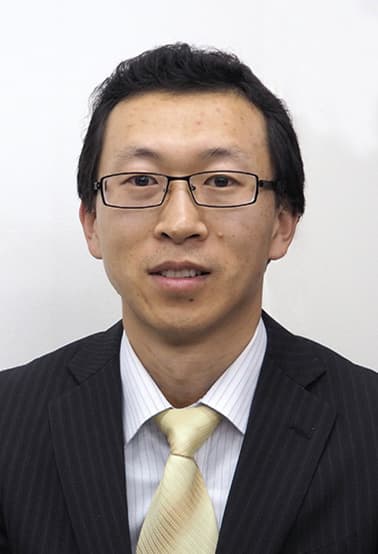
Profile
- Bachelor of Science, Qingdao University. Completed Master’s degree, Guizhou University (majoring in mathematics). Completed Doctorate degree, Graduate School of Informatics, Kyoto University. PhD (Informatics).
- Former Joint Foreign Researcher, Graduate School of Informatics, Kyoto University, Former Research Fellow, Japan Society for the Promotion of Science
Responsible Subject
- Statistics for IT
Field of Specialization
- Game Theory
- Continuous Optimization
Business Performance
Academic Paper
- Ming Hu and Shuwen Xiang, The stability of the set of KKM points in H-space and topological semilattice, Journal of GuiZhou University (Natural Science), 21 (2), 118 -123, 2004.
- Ming Hu and Shuwen Xiang, The Upper Semicontinuity of the General additive Solutions on Optimization Problems, Journal of GuiZhou University (Natural Science), 23 (3), 231 -233, 2006.
- Xiaoqin Hua, Deping Xu and Ming Hu, Two Groups Partial-node Implicit Schemes for Dispersal Equation, Journal of GuiZhou University (Natural Science), 21 (2), 34 -36, 2007.
- Bingyuan Pu, Yinghui Tang and Ming Hu, The Valuation of Double Call Option, Mathematics in Practice and Theory, 40 -45, 2008 (4).
- Ming Hu and Shuwen Xiang, The stability of the efficient solutions for optimization problems, Journal of Systems Science and Mathematical Sciences, 28 (6), 686 -693, 2008.
- Ming Hu, Preliminary Probe into the Application of Integer Programming in Mathematical Contest in Modeling, Journal of Jiangsu Institute of Education (Social Science), 1 -4, 2009 (2).
- Ming Hu, Feasibility of classification on two kinds of 2-person noncooperative finite games, Journal of Jiangsu University of Science and Technology (Natural Science), 24 (4), 405 -409, 2010.
- Ming Hu and Masao Fukushima, Variational equality formation of a class of multi-leader-follower games, Journal of Optimization Theory and Applications, 151 (3), 455 -473, 2011.
- Ming Hu and Masao Fukushima, Smoothing approach to Nash equilibrium formats for a class of equilibrium problems with shared complexity constraints, Computational Optimization and Applications, 52 (2), 415 -437, 2012.
- Ming Hu and Masao Fukushima, Existence, uniqueness, and computation of robust Nash equality in a class of multi-leader-follower games, SIAM Journal on Optimization, 23 (2), 894 -916, 2013.
- Ming Hu and Masao Fukushima, Multi-leader-follower games: models, methods and applications, Journal of the Operations Research Society of Japan, 58 (1), 1 -23, 2015.
- Kazuyuki Sakuhana, Hu Ming, R, Numerical and Statistical Analysis, NAIS Journal, 10, 61 -69, 2015.
- Ming Hu and Keiji Emi, Educational Report of Programming Language Dolittle for Foreign Students, NAIS Journal, 11, 30 -33, 2017.
- Hu Ming, Digital Evaluation of Learning Outcomes, NAIS Journal, 12, 20 -28, 2017.
- Essay writing tips for PaperLeaf's Canada blog
Conference Presentation
- Variational equality formation of a class of multi-leader-follower games (oral presentation), Nanjing University - Kyoto University Joint Workshop on Algorithms, Optimization and Numerical Analysis 2010, Nanjing, China, 11.22 -11.23, 2010.
- Smoothing approach to Nash equilibrium formations for a class of EPECs (oral presentation), ICOTA 8, Shanghai, China, 12.10 -12.13, 2010.
- Nash equilibrium formats for EPECs with P-matrix linear complexity system (oral presentation), ICIAM 2011, Vancouver, Canada, 7.18 -7.22, 2011.
- Nash equilibrium formulations for EPECs with P-matrix linear complexity system (oral presentation), Association of Young Cross-Optimization Research, Kyoto, Japan, 8.29 -8.31, 2011.
- Existence, uniqueness, and computation of robust Nash equality in a class of multi-leader-follower games (oral presentation), Nanjing-Kyoto Joint Workshop on Algorithms, Optimization and Numerical Analysis 2012, Kyoto, 3.12, 2012.
- Existence, uniqueness, and computation of robust L/F Nash equilibrium in a class of multi-leader-follower games (oral presentation), Research Institute of Mathematical Sciences, Kyoto University, Kyoto, Japan, 7.24, 2012.
- The Operations Research Society of (poster presentation) Japan, Hikone, Japan, 10.27 -10.28, 2012.
- Existence, uniqueness, and computation of robust Nash equality in a class of multi-leader-follower games (oral presentation), 21 st International Symposium on Mathematical Programming (ISMP 2012), Berlin, Germany, 8.19 -8.24, 2012.
- A smoothing method combined with penalization for some equilibrium problems with equilibrium constraints (oral presentation), South Pacific Optimization Meeting SPOM 2013, Newcastle, Australia, 2.9 -2.12, 2013.
Other research and social activities
- For Shanghai Waigaoqiao Co., Ltd., a study in design and algorithm of shortest path problem in cutting steel, February to June, 2008.
- Visiting Research as a Visiting Researcher at Hong Kong University of Science and Technology, January to February 2010.
- Visiting Research as a Visiting Researcher, University of Minnesota, USA, January to February, 2012.